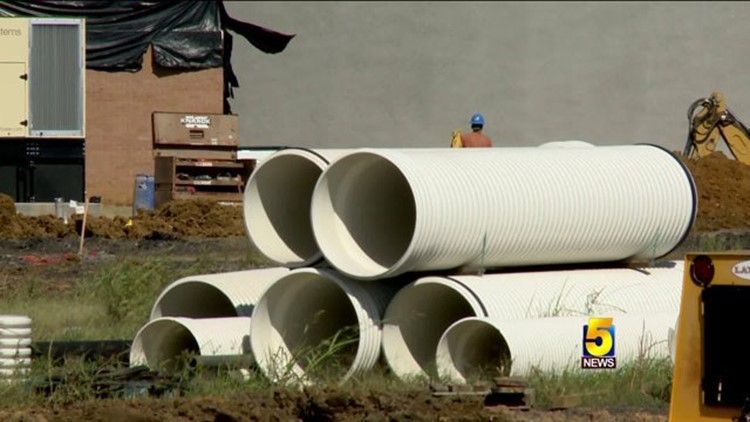FORT SMITH (KFSM) – The average Fort Smith family’s water and sewer bill could double to just more than $80 over the next five years if the city approves a plan later this month that would bring it into compliance with federal clean water laws.
City officials on Wednesday released the prospective water and sewer costs that could be passed on to customers over the next five years. The costs are part of a consent decree the Board of Directors discussed at a meeting Monday (Dec. 1). City directors will continue to discuss the plan Dec. 9, before potentially approving it at the follow board meeting.
The plan calls for the average Fort Smith family’s water and sewer bill to increase in 2015 from $40 to $60 per month. It would then increase steadily over the next few years before settling at about $81 per month, according to the city.
Fort Smith officials have been in ongoing negotiations with the federal government concerning sewage overflow problems. City administrators have been meeting with members of the Environmental Protection Agency over the last several weeks to craft a plan to get the city in compliance with the Clean Water Act, after the EPA said the city has spent the last few decades violating several aspects of the federal law.
In order for the city to implement steps to comply with federal clean water laws, Fort Smith customers’ water and sewer bills will double by 2019 if the plan if officially adopted by the city at its Dec. 16 board meeting.
City officials stressed water and sewer bills vary customer-to-customer, and the projected costs only account for the average local family. Under the plan, water costs would largely stay steady over the next five years, while the sewer portion of the water and sewer bill would increase, potentially leaving households with a total bill twice as large as in 2014.
The consent decree discussed by city directors Monday would also accept a $500,000 fine from the federal government. Of that, $300,000 would go to the government and $200,000 would go toward funding low-income housing in Fort Smith, according to Kevin Settle, who is on the board of directors.
Fort Smith officials hope the consent decree expresses the city’s desire to continue to address the sewage overflow problem while following federal laws concerning the Clean Water Act, according to a memo forwarded to city directors by city administrator Ray Gosack.
City administrators have been working with the U.S. Department of Justice and the EPA over the last eight years in order to comply with the federal Clean Water Act after environmental officials complained of sewage overflows during episodes of heavy rainfall because of the city’s decades-old sanitation system.
The wet weather overflows of sewage in Fort Smith are caused by rainwater entering the sewer system through defected manholes and underground pipes. The rainwater overwhelms the capacity of the sewer system, causing untreated sewage to overflow from the system, according to the city.
By committing $200 million to solve the problem, city officials said they have reduced the number of wet weather overflows by 79 percent. The city also has $30 million in construction either under way or upcoming, officials said.
Repairing and replacing the city’s sewer pipes could cost as much as $205 million dollars on a capital scale, Settle said. Fort Smith will have 12 years to fix its sewer system according to the settlement with the EPA, he added.
Although city administrators are in negotiations with federal authorities, negotiations two months ago initially broke down, causing officials to prepare in September and October for a lawsuit that never came. Negotiations later picked back up between the two entities, and now city leaders say they are doing everything they can to fix the overflow system and follow the law.



